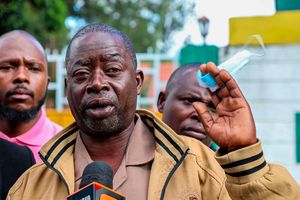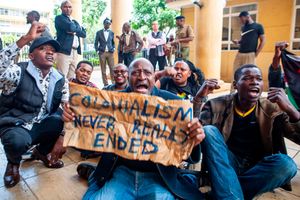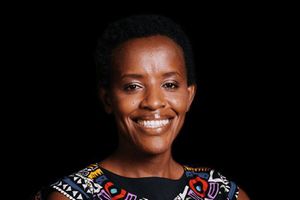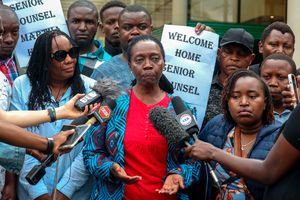
Activist Hanifa Adan At Jomo Kenyatta International Airport in Nairobi on May 19, 2025.
Hanifa Adan, an activist raised in Korogocho in Nairobi, has drawn admiration and a fair share of ridicule for her involvement in fundraisers.
Since the wave of anti-government protests began in June 2024, she has been known to coordinate the raising of money to support various causes.
Notably, those who were hurt during last year’s protests had a helping hand from the monies collected by Hanifa from well-wishers.
In a recent interview, she explained how she realised the power of fundraising through M-Pesa. She said it began with flooding that affected Nairobi’s Mathare area, where she saw people lose all their possessions.

Activist Hanifa Adan.
“The government did nothing. I fundraised over Sh1 million in about two days. That’s when I realised I could do something,” she said, adding that that is the time she was “properly radicalised”.
In the interview, she also discussed how she got into activism and why she thinks about death almost every day. Here are excerpts.
Tell us a little about Hanifa. How does Hanifa become Hanifa?
Hanifa becomes Hanifa by being a nosy person. I’ve never been a bystander. I’ve always been the loud, bold girl who wants to be at the centre of things; not because I want to make noise, but because I want to learn and understand what’s happening. And I think that’s why I even joined activism. I could never ignore injustice. I was the girl who got in trouble for asking too many questions. I still am.
What was the first thing that made you become this public person?
It wasn’t political at first. I started by posting pictures from Korogocho, where I grew up. I wanted to show the beauty of my community. Then I started speaking on social issues—floods, corruption, girls missing school because of periods—and people started listening.
Tell us about the moment you were on the streets in the first protest.
The protests began on June 18. That was the first one. I was the first protester to be arrested that day. I came out green, naïve. I had printed T-shirts saying “Reject Finance Bill”. I stood with them in a paper bag, handing them out. And then this officer approached me, very aggressively. Started insulting me, took my T-shirts and arrested me. I didn’t even know what station they were taking me to.
Let’s talk about what happened last year...
I remember standing outside Jamia Mosque right before it happened. I was texting people, giving out shirts. And then boom, I’m in cuffs. I was taken into a cell and found these babies, young Gen Zs, so strong, but shaken. They didn't cry. I was the one crying. And they kept telling me, “We’ve been here since morning.” One of them even said, “Don’t cry. If you cry, they’ll break us.” That stayed with me.
What is your earliest memory of understanding there was a problem with the Finance Bill, 2024?
We were already angry about so much. Then the Finance Bill gave us something to focus that anger on. We said, “No, enough!” We weren’t going to sit quietly anymore. It gave me a reason to go outside. It gave me life.
If you reflect on your personal life and journey, what do you think is the biggest sacrifice you have made?
I miss silence. I miss walking into rooms and not being recognised or judged. I miss not being scared when I hear sirens. But I gave that up because there’s a girl somewhere who thinks I’m brave. And I have to be brave—for her.
How do you deal with trolls?
I’ve been told I’m too loud. Too visible. Too Somali. Too Muslim. But I refuse to be humbled. They want me small. But I’m big. And I’m not shrinking.
Are you winning that fight?
Yes, because I’m still here. Still loud. Still showing up. I’m setting the precedent for a girl who looks like me to walk in without fear.
Are you not scared of dying, being killed?
I think about it every day. But I also think: If I can change even one girl’s life, it’s worth it. My death will not be in vain. So, no, I’m not scared.
Where do you think the movement will be in five years?
I think we’re building something real. This isn’t noise, it’s structure. It’s legacy. In five years, we’ll have leaders who were born from this fire. And girls like me will finally belong.
What would you tell the relatives of those who have been killed?
I’m sorry. I’m so, so sorry. But I promise you, we are not letting their names fade. We carry them in every step, every chant, every win. We carry them.









